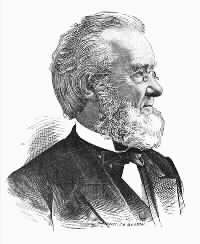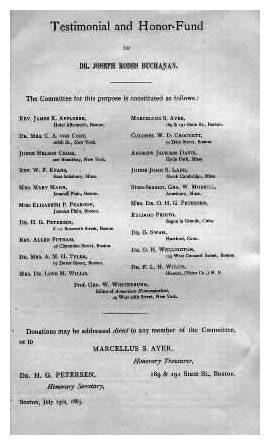Joseph Rodes Buchanan
(1814-1899)
 Joseph Rodes Buchanan was an American scientist, Faculty Dean and Professor in the Eclectic Medical Institute, in Covington, Kentucky, and research pioneer in psychometry. It was Joseph Buchanan who, in 1842, coined the term “psychometry” as meaning the “measuring of the soul.”
Joseph Rodes Buchanan was an American scientist, Faculty Dean and Professor in the Eclectic Medical Institute, in Covington, Kentucky, and research pioneer in psychometry. It was Joseph Buchanan who, in 1842, coined the term “psychometry” as meaning the “measuring of the soul.”
General Bishop Polk of the Civil War once told Professor Buchanan of his curious sensitivity to atmospheric, electric, and other physical conditions. If he touched brass in the dark, he immediately knew it by its influence and the offensive metallic taste in his mouth.
Dr. Buchanan began to experiment and soon discovered that these sensations are not restricted to the sense of taste alone. Students at a Cincinnati medical school registered distinct impressions from medicines held in their hands. In order to eliminate thought transference, the substances were wrapped in paper parcels and mixed.
Eventually, it became evident to Dr. Buchanan that some type of emanation is thrown off by all substances, even by the human body; furthermore, certain sensitives can feel and interpret these emanations in their normal state. Actually, he was staggered by the possibilities of this discovery. He stated:
“The past is entombed in the present; the world is its own enduring monument; and that which is true of its physical is likewise true of its mental career. The discoveries of Psychometry will enable us to explore the history of man, as those of geology enable us to explore the history of the earth. There are mental fossils for psychologists as well as mineral fossils for the geologists; and I believe that hereafter the psychologist and the geologist will go hand in hand, the one portraying the earth, its animals and its vegetation, while the other portrays the human beings who have roamed over its surface in the shadows, and the darkness of primeval barbarism. Aye, the mental telescope is now discovered which may pierce the depths of the past and bring us in full view of the grand and tragic passages of ancient history.”
If you consider this statement, along with the era in which it was spoken, it really is quite remarkable how far ahead of his time Dr. Buchanan was.
He called the subtle emanation given off by the human body “nerve aura.” In the Journal of Man, one of the first Spiritualist monthlies, he published a complete exposition of his system of neurology and anthropology.
Psychometry, for Dr. Buchanan, was essentially a human faculty of the mind; he did not feel it involved the intervention of spirits. However, Mrs. L. A. Coffin, in her preface to Dr. Buchanan’s Manual of Psychometry (Boston, 1889), states that she was often impressed by spirits while performing psychometry. This was not in conflict with Dr. Buchanan’s views, as he was an avowed Spiritualist. He simply felt that psychometry was primarily a psychic faculty, not a mediumistic influence.
His classic, Manual of Psychometry, is considered to be the most authoritative text written on psychometry.
Finally, he was one of few medical professionals who, with great determination, defended the Fox sisters, when they were experiencing incredible negative publicity.
In the course of his investigations, primarily through the mediumship of Mrs. Hollis-Billing, Dr. Buchanan received direct writing, purportedly from St. John. After being held in privacy for 17 years, these communications were published in 1897 under the title of “Primitive Christianity. Containing the Lost Lives of Jesus Christ and the Apostles and the Authentic Gospel of St. John.“

He claims that he tested the St. John script, properly concealed, with three psychometrists – Cornelia Buchanan, Mrs. Hayden, and the famous Dr. J. M. Peebles – and all three agreed as to its source, giving very similar descriptions of a great spirit devoted to Jesus Christ. I have read this book and, personally, I am not totally convinced that it is direct communication from St. John. Nonetheless, the text is quite remarkable.
On other occasions, but in similar manner, Dr. Buchanan obtained between slates a portrait of Moses and the Tablets of the Law, a picture of Aaron, of Helen of Troy, of John the Baptist, and communication from Confucius. Again, he substantiated the sources of these items though reputable psychometrists.
Regardless of what one may think of these more recent revelations, the work of Joseph Rodes Buchanan played an important role in the history of Spiritualism. He was a pioneer in one of the most amazing and mysterious faculties of human consciousness.
Our founder and benefactor, Marcellus Ayer, was a close friend of Dr. Buchanan. He served as Honorary Treasurer on a committee established to help promote the research Dr. Buchanan was conducting on psychometry. The committee consisted of reputable Boston Spiritualists, including the renowned Andrew Jackson Davis.
If you look at the image above, the back cover of a pamphlet which was published in 1885 and sold for the benefit of “The Testimonial and Honor-Fund to Dr. J. R. Buchanan.” Marcellus Ayer’s name is fairly easy to make out and, with a bit of focus, you can see the name of Andrew Jackson Davis (right column, third name down).
RETURN TO THE SPIRITUAL TEACHINGS MAIN PAGE
First Spiritual Temple
Kingston, NY 12401
Email us [email protected]
Please consider making a tax-deductible donation to our Temple. You may also donate via check, payable to "FIRST SPIRITUAL TEMPLE TRUST" and mailed to: 104 Van Gaasbeck St., Kingston, NY 12401. Thank you.
